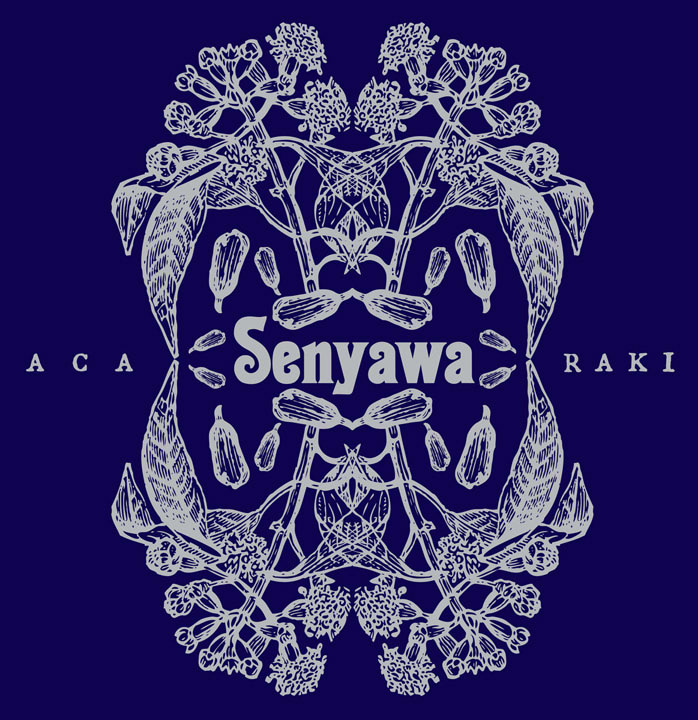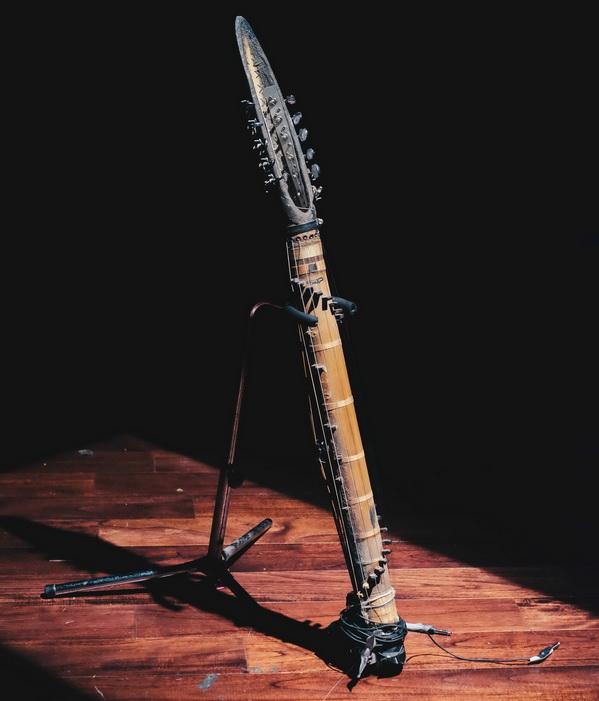 blazer's domain
blazer's domain
The first full length album by Indonesian experimental duo Senyawa (/səˈɲawa/; suh-NYAH-wah) released in 2014.
Listen on Bandcamp YouTube Spotify

Senyawa is made up of two people, Rully Shabara, experimental vocalist, and Wukir Suryadi, instrument inventor. Expect from their music vocal experimentation, handmade instruments, and a generally fucked up atmosphere. Probably their most famous work is when they featured alongside Colin Stetson in the soundtrack of RDR2, which I haven't played. They also seem to be known for their live shows in particular, check out their performance at Borobudur for a random example.
The main point of this page is to provide translations, or try to at least. I did my best. There's also commentary for the tracks which I have anything to say about. My sources for the lyrics are people who submitted them to "Musixmatch" so if you have any doubts, take it up with them.
Notes about Indonesian: gender, number, definiteness, and verb tense, are not necessarily expressed:
Acaraki is a Javanese title for someone proficient in making "jamu", traditional medicine.
"Pada" (at) "siang" (daytime, noon) hari ("day, 24 hour period") "In the Day"
Lelaki baya mendayung sampan |
An old man rows his boat |
Pria muda menjulang tinggi |
A man stands tall |
Manusia berkeringat |
Humans sweat |
I think this sets the tone well. This probably has the most straightforward lyrics out of any of their songs, though.
The instrument featured throughout this album is the Bambu Wukir, a big bamboo tube zither thing. I am at a complete loss as to how it can make like three different sounds at once, seemingly all from being plucked. Go find a video, it's awesome.

"Post", prefix meaning "after".
Matahari terkubur senja di ujung hari |
Dusk buries the sun at the end of the day |
Abu mereda, debu dan pasir menyingkir |
Ash clears, dust and sand gone |
Bersama, bersama, bersama |
Together, together, together |
Matahari merekah cerah di awal hari |
Dawn breaks bright at the start of the day |
"Remains"
Reruntuhan |
Ruins |
Pilu hati ini | This sorrow of the heart |
Rindu hati ini |
This longing of the heart |
Usai sudah |
Finished now |
This one introduces the use of the Bambu Wukir as a bowed string instrument. I love this one! I enjoy the latter half with the repetition + accelerando. Big on repetition + accelerando.
"se-" ("one", "same") + "nyawa" ("life"); "Compound"
I can't find the lyrics for this one anywhere, sorry. From what I can discern, I believe he says "Senyawa berpadu jiwa", "Senyawa unites (its) souls" or "A compound, unity of souls".
Anyways, the Bambu Wukir sounds fucking sick here, especially when it kicks in again after the middle part where it alternates between the "drum" sound and the harsh scratching.
"Kereta" (train) "tak" (not) "berhenti" (stop) "lama" (long), "The Train Does Not Stop for Long"
Naik kereta api, tut tut tut |
Riding the train, toot toot toot |
Siapa hendak turut? |
Who would like to come along? |
One of my favorites. This one is actually based on a children's song, Naik Kereta Api, about, well, riding the train.
It starts out with a familiar tune, the Westminster Quarters. Famously used by the Large Clock of England, among other things, it is used in Indonesian train stations to signal departures and arrivals. Live anywhere near a station and you'd be hearing this constantly.
The final note is repeated again and again. String-drums escalate, the brakes hiss, and then it settles into a stable tempo. Like a train! Just departed, accelerating into and then reaching its top speed, ready for the journey ahead.
I don't know how to describe the mood of the song. A relatively tame melody accompanied by several things that are just slightly off. The intense "drums", the single line ever repeating, the dissonant high pitched chords, the sometimes ethereal vocals. Uncertainty, like getting on a train, leaving home behind, unsure of how your destination will treat you.
And then, train scatting! I don't know, I like it. Especially later when it then suddenly shifts into aggressive hissing, responding to the string-drum hits. And immediately following that is a sudden, just celestial variation on the opening line.
Pneumatic brakes steadily bring us to a stop, and the melody sounds, signalling our arrival. Though, you don't hear the last note...
Javanese, "jaran" (horse) + "-an" (-like), "Hobby-horse" or "Horse-like thing".
Jaranan is a Javanese thing where essentially performers dance with hobby-horses accompanied by gamelan. The dancers are often in a trance and, sometimes, they eat glass!
|
Jaranan, jaranan |
Jaranan, Jaranan |
Sing nunggang Ndoro Bei |
Lord Bei is riding |
"Teji" is literally a word for "strong horse". The song is saying it's a "strong-horse horse". I don't know how else I'm supposed to translate it.
So this one is, in fact, also a take on a children's song, and I like it a lot. It's relatively normal until the part that would be something like "cek cek nong"; which is onomatopoeia for the instruments that would be playing at a Jaranan performance. Non-lexical vocals are common in the music accompanying Javanese folk dances, and this is that mixed with like murderous rage, while the Bambu Wukir matches Shabara perfectly.
"Di" ("at") + "pudar" ("gloomy", "pale") + "-nya" ("the", roughly) + "senja" ("twilight; dusk"), "In the Pallor of Twilight"
Bersembunyi di temaram senja |
Hiding in the gloom of twilight |
Gelap menyergap di pudarnya senja |
Darkness ambushes in the pallor of twilight |
Tetaplah gagah, wahai putri yang bersembunyi |
Remain courageous, daughter1 in hiding |
1. "They" here refers to a singular person
2. "Putri" translates as both "daughter" and "princess"
Another one of my favorites, short but sweet. The way this song, and in particular the Bambu Wukir, sounds here is again really hard to describe for me. There's somehow a mix between warmth and dread, perfectly complementing these lyrics.
The outro starting at 1:35, is really fun. I find myself randomly singing it; the rhythm and rhyme work together so beautifully well. Kala menTARI bangkit kemBALI esok PAGI
"News"
Berenanglah menuju pulau seberang |
Swim towards the island across |
Bersiaplah, bersiaplah, bersiaplah, bersiaplah! |
Be prepared, be prepared, be prepared, be prepared! |
Badai, petir akan menghantam |
Lighting storms will strike |
Bersiaplah, bersiaplah, bersiaplah, bersiaplah! |
Be prepared, be prepared, be prepared, be prepared! |
Alright. I fucking love this one.
Opens with the most foreboding slow, echoey, plucked solo on the Bambu, with one persistent low chord periodically reasserting itself. It finishes, and the last notes fade into silence.
Goddamn. Shabara begins SCREAMING warnings of a colossal wave, accompanied by frenzied playing continually alternating with dead silence.
He stops for a moment, as you get to listen to the Bambu better, before piercing screams, demanding you listen, tell you to prepare yourself, over and over and over. Steadily it all slows down, the Bambu going into another solo reminiscent of the first.
Now, I'll be frank: this middle bit I do not care for that much. I think the bassline is kinda boring. I do like how he says "menghanTAM" though.
Anyways, the Bambu immediately starts back up at full speed, and does not slow down. Yet again the listeners are told to BERSIAP, as the shouting and the strumming reach unprecedented heights and speeds and everything COLLAPSES INTO UNCEASING SCREAMS AND
Great song!
"Hero"
Translator's notes: "they" is singular
Ia terus bernyanyi |
They keep singing |
Gading gajah tertinggal abadi |
Elephant ivory left eternally |
Pahlawan tak mati di sini |
Heroes do not die here |
"Eclipse"
Pada detik rindu menetas menjadi buih sesal |
The second that longing hatches into boiling regret |
Jika lebih seksama kudengar acak gemerisik sekitar |
If I listened closer to the rustling |
Pada waktu bibir beranak kutuk |
When the lips bore curses |
Cerca aku karena tak cakap baca pesan |
Scorn for I could not read the message |
Rupanya itu rahasia yang mereka hendak sampaikan |
As it happens, that was the secret they wanted to convey |
This one was a real motherfucker to translate. Some languages tend to be very loose with word categories, so with literary registers I often have no idea if a word is being a noun or adjective or adverb. I think I just need to read more.
Kaili, "leader" or "hero"; it's apparently a concept that's not easy to translate.
The menacing closer. Has to do with the mythology of the Kaili people of Central Sulawesi. Rully Shabara himself was born in the city of Palu.
The words being repeated are "tomalanggai" and "tomanuru". From what I can understand, Tomalanggai was a chief who is said to have ruled the Kaili before the time of kingdoms, while Tomanuru is a being who came down from the heavens in the form of a woman and married him.